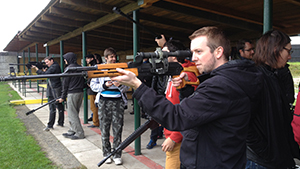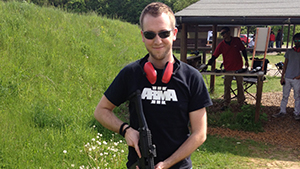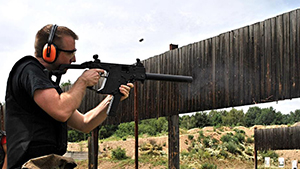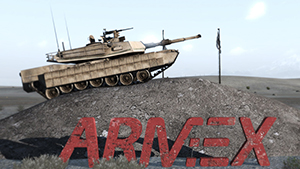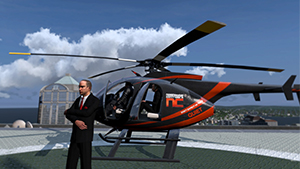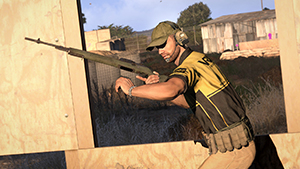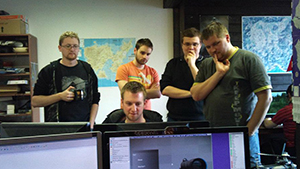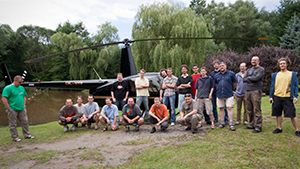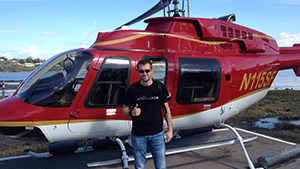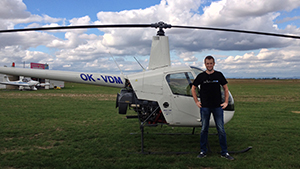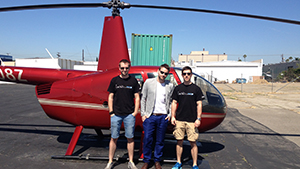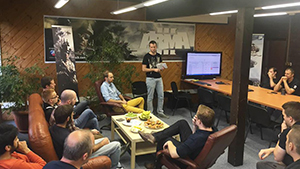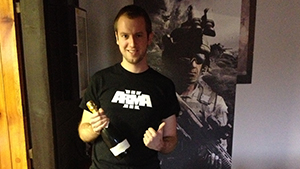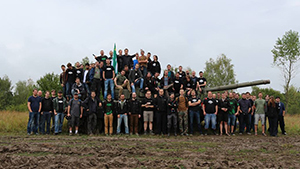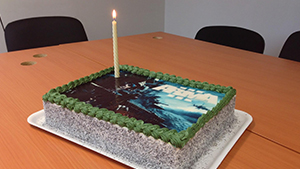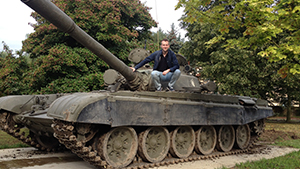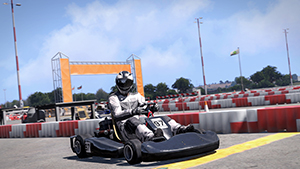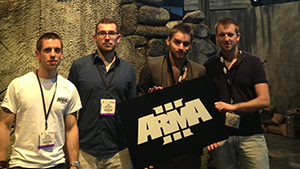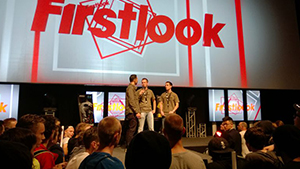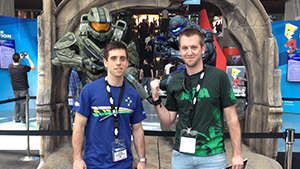Hallo and welcome to the first 'Report In' dev interview of 2016. Today's special guest is none other than Bohemia veteran, Joris-Jan van 't Land!
Until recently, Joris-Jan was the Project Lead for Arma 3. Following a gradual transition period, this role has now been handed over to our very own Petr 'Lord of the Bounce' Kolář. And although Joris remains involved in Arma 3's development, he's also started to prepare for his next mission. Thus, with a lot to reflect on, and to look forward to, it felt like the perfect moment to Report In.
We're often asked to let some of our people talk about what it's like to develop a game at BI. 'Report In' gives you a more personal perspective on our team, a more detailed look at the way we go about our work, and fresh information about our ongoing projects.
Introduction
Please tell the people a little about yourself. What's your role? How long have you been with Bohemia Interactive? Which projects have you contributed to and what is your favorite BI game or mission?
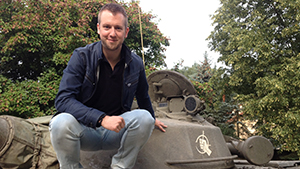 Hi, I am Joris and I've proudly served as the Arma 3 Project Lead from September 2012 until late last year. Now I'm assisting the new leader, Petr Kolář, and his team as Producer, while I'm preparing for my next adventure with Bohemia Interactive.
Hi, I am Joris and I've proudly served as the Arma 3 Project Lead from September 2012 until late last year. Now I'm assisting the new leader, Petr Kolář, and his team as Producer, while I'm preparing for my next adventure with Bohemia Interactive.
My first contact with the company was in 2001. Since then I've worked on its games either as external contractor or employee, so that's some 15 years now. I couldn't have wished for a more creative, diverse and interesting career. The projects I've been involved with are: Operation Flashpoint: Cold War Crisis / Resistance / Elite, Virtual Battlefield Systems 1, Arma 1 / 2 / 3, Take On Helicopters, and DLC / expansions for most of them. Resistance would be my favorite, although I remember the "Ambush" mission from the original OFP demo most fondly. It showed something new and impressive. You were but a single soldier amidst an on-going battle, with AI fighting each other on your flanks and play-throughs being different every time. I must have played it hundreds of times, not counting the hex-edited modifications!
And can you give us a random fact about yourself?
As an emergency back-up, I did 2 lines of 'voice-acting' for the Arma 2 campaign. "OK, set!", from a first-person breaching scene, still haunts me through the office regularly.
Going Back
How did you arrive at Bohemia? And what's your relation to the Arma series?
Since I was a young boy, I've had a perhaps morbid fascination with warfare and military technology. It's a nasty topic that's part of our human history and sadly continues to be. I found Bohemia Interactive's presentation of this complex theme to be very inspiring from the moment I first saw an OFP preview in a magazine. It was not player-centric and nobody really cared you were the player; that random bullet would kill you regardless. It was also gritty, dirty, gray, layered and didn't shy away from tough subjects. On top of that it was one of the first good examples of what a sandbox game is. This led me and a friend to join a fan website about a year before the game's release: Operation Flashpoint Network (OFPN). From there I developed a relationship with the company and some of its veterans, which blossomed into bits of volunteer contributions and eventually an actual job at a new Australian office.
Most of my work on the Arma games was as Designer. This covered absolutely everything, although I specialized towards more technical design and scripting over the years. In Arma 0 (OFP) I helped out with a Sector Control multiplayer mode and produced some of Resistance's cutscenes. When I look back at the insanely lengthy outro cutscene especially, I'm not sure whether to be proud or ashamed. Don't ask me what really happened to Viktor Troska's body! A desire to have an interactive overview of all assets in the game, then prompted me to design and develop the Library mode for Arma 1. This later evolved into the Armory and multiplayer ARMEX for Arma 2. I've also worked on a series of systems to support dynamic gameplay, such as the Ambient Combat Module and Secondary Operations. This still is a field of development I hope to return to eventually. For some of the downtime during Arma 3, the team was kind enough to let me do a bit of design, namely the Firing Drills and Time Trials. These allowed me to do some hands-on creative work, while contributing non-essential but hopefully fun content to the game.
A veteran! What have been some of the key changes at Bohemia since those early days?
The first encounter with Bohemia Interactive was meeting a small 8-person team in a factory complex in Prague. We played a co-op LAN game with the entire OFP team, and I managed to accidentally blow up everyone with a rifle grenade; not the best first impression. Many things have changed, but I'm glad to see most parts of the culture to be in tact. It remains a place where you can develop yourself with a lot of freedom. We've been through some Hollywoodesque ups and downs, but we're still here and still independent.
For the longest time, we were a small studio working on one main project in one team. Over recent years we've obviously expanded a lot. This continues to cause some growing pains as we professionalize the company, but the future is looking very bright. As for differences? I no longer actually know every person in the company. There are new faces to remember every time we all meet up, but that also brings in a lot of fresh energy. It has also become harder to handle all aspects of development yourself. I remember doing basic modeling, texturing, configuring, particles, sounds, scripting and more (and mostly not at a splendid quality level). Now there are more and deeper specialties, all contributing to massively complex software beasts. Then again, with tool and engine improvements going on, some of this power is returning to individual developers and we're able to experiment with fun little games.
Take On Helicopters was your first game as Project Lead. Can you tell us a bit more about this experience?
On many levels I still cannot believe we actually finished that game! It was a very ambitious project in which we tried to leverage the strong parts of our tech for a non-combat game. Considering the small team and short timelines, we did something pretty cool. By no means was it a perfect game, but it sits in a mostly unexplored sim-game genre gap and still is fun to play. After so many years of military Arma games, the change of pace was welcomed by myself and others. I developed a habit of just flying a helicopter around Seattle, listening to Jazz music and achieving some form of Zen.
This was my first real world project leadership experience after my studies, so it taught me a lot of things about all aspects of making games. It forced me to step outside my comfortable design zone and learn about distribution, publishing, marketing communications, legal, ratings, third-party cooperation, etc. It has also kindled a love of helicopters, maybe unsurprisingly. For every city I visit these days, a helicopter tour is mandatory. Recently I've even had my first piloting experience in a R22. One of the coolest things happened during the first months of development however. Myself and a few colleagues were invited to fly along with a wealthy Czech private pilot with his own brand-new MD-520N. We buzzed the tree tops, landed at improvised locations, dodged goats and had hours of exhilarating flight time. But, to my colleagues' chagrin, my most enjoyed time was spent with a very egotistical hobby side project: Take On Noisecontrollers. It let me combine some of my passions, connect with awesome people, visit events behind-the-scenes and release a very small cool DLC for the game for free.
Arma 3
When/how did you become Project Lead on Arma 3?
These were tumultuous times. Arma 3 had been in development for some time, but it had also evolved from a project with a different vision and direction (code-named "Futura"). While in itself this could have been a very cool game, it was deemed to stray from something expected of an "Arma 3". The company CEO, Marek Španěl, asked me to take over with the mandate of guiding the project to a release in 2013. Then something very unsettling happened. On the day I finally accepted the challenge and informed Marek, he told me he had just been on the telephone with one of our friends and colleagues imprisoned in Greece. This was the start of a stressful period, most of all for Ivan and Martin, who we're happy to see back with their families now.
My first task was to do a comprehensive project review, meet with every individual on the team, see about the great foundation work already done on the Altis terrain for example, but also decide about many things which we needed to cut, change, fix and finish. Canceling the entire game was an option on the table several times. But we fought through this madness and somehow got caught up in a perfect storm of a passionate team, pragmatic solutions, a sense of focus, beneficial changes on the Steam platform, Early Access kicking off and live streaming changing the landscape of game promotion. That storm has led to Arma 3's release and continued success.
What are/have been some of the biggest challenges of being Project Lead (specifically on Arma 3)?
By far the biggest challenge has been to run a team across two physically separated offices. We had no real experience with this and it's been a struggle to deal with logistically (keeping all data synchronized) and personally (not being able to quickly communicate in person). We were also faced with many difficult decisions that were born from crisis management rather than a vision for the game. The set of vehicles, weapons and characters had to be reconsidered and shuffled, we distanced ourselves from the original Greek setting, knew we could not deliver some teased features such as the 3D Editor, and more. In hindsight I believe we made the right call for most of these, and I'm even happier to see us make up for a lot of it in the long run.
We're also developing using an ageing engine and tool-set. Real Virtuality still does certain things better than the newest versions of popular alternatives out there, but we're not oblivious to its short-comings (which is why a new Enfusion engine is in development). Still, for an engine never designed with 100+ player persistent and deeply modded servers in mind, amazing things are accomplished with it every day. The freedom offered to modders is another extremely powerful double-edged sword. It gives us plenty of head aches trying to keep backwards compatibility with mods in mind, or to adapt to changes in Windows, hardware drivers, third-party libraries and Steam. In many ways Arma 3 is an uncontrollable beast that we all love very much. The custom content library created by modders is mind-boggling and Arma would not be as strong without this mutual effort to keep it alive and kicking.
There is plenty more to cover; at some point I'd like to do a proper post-mortem and a blog about the brave battles of live support.
And how do you look back on the Alpha/Beta Early Access experience?
Ironically, Arma 3 is hardly ever mentioned as the first title to graduate from the Steam Early Access program, but it was. It's probably a good thing - the process felt natural, even if it demanded a lot of patience from players. Of course we started as a traditional project, so we used a sort of hybrid methodology in the end. There was a solid public Alpha with a playable and impressive sub-set of the game. We followed on with themed content packs, campaign episodes and later DLC. And since modding was possible through-out, there was a big library of scenarios and mods even at 'launch'. Gone was the single shot release date, welcome to games as a service.
We also take pride in our unique level of transparency. Since the Alpha, we have released a daily experimental build containing the most recent fixes and changes. There has been a lot of feedback to anything we do, some of it useful, some of it less so. But it has definitely helped to shape the game, prioritize work, and to gauge reactions to controversial tweaks. Besides that there is a very practical benefit: simply testing the software in the wild on the unlimited combinations of hardware and software. All in all, we've enjoyed Arma 3's approach to Early Access and learned a lot to take to future projects.
Can you name some of your personal (Arma 3/Bohemia Interactive) highlights from the past 3 years?
There have been many, but it started with the very well-received public Alpha release. This was a huge morale boost to the team and gave us the fortitude to keep going. A fair bit later, I remember our live stream reveal and surprise Dev-Branch release of the Zeus framework. Karel Mořický and Filip Sádovský created something special that shows off the sandbox nature of the game very well, a cooperation they now continue with the upcoming Eden Editor. It's also been creatively challenging to devise a fair DLC strategy, which supports on-going development with premium content, but provides as much as possible free stuff to all players. We can think of improvements, but overall it has just worked for all parties involved. We tested our ideas with the fun (charity) Karts DLC originally pitched by Martin Valášek. By Marksmen DLC it had become a proven strategy, and we had also delivered on the road map as promised.
On a more actually personal level, it was very exciting to finally reveal the Tanoa terrain at the PC Gaming Show in Los Angeles. I'll admit to being quite nervous. This was the biggest live 'stage' I'd ever been on. We got nice reactions and the trip itself was spectacular - flying a copter over the E3 convention center being no exception! Speaking of using cool vehicles, we had a blast driving around in our very own T-72. Racing the tank, a BMP and an offroad truck through the mud caused many flashbacks to OFP to appear in our minds. We've also visited a couple of shooting ranges for research and inspiration. Firing actual weapons is not a common activity for me, so it still feels strangely exciting, powerful and also a little unnerving to use large caliber rifles even in the relative safety of a range.
Your favourite SITREP?
Wow, that's an almost impossible question. We started SITuation REPorts as a channel for anyone in the team to share their work, alert about changes that may affect mods and to promote cool community goings-on. More selfishly, they were a tool for me to stay in touch with the Arma scene. It forced me to scan all channels where the game might be discussed, good or bad. Certain weeks it was hard to find content, because we might be deep in 'boring' testing. But I liked writing them and being able to put a spotlight on the people who deserved it. At this point I also must share the pride in my brother, Korneel van 't Land, who has taken Bohemia Interactive's Marketing Communications to a completely new level. With a focus on Arma 3, he has adapted to a changing games industry and project, and delivered a huge amount of info to players. Great job bro!
Oh, my favorite SITREP? Probably #00087 as it was a nice wrap-up of 2014 with an optimistic outlook for the next year.
Where do you see Arma 3/Arma series go from here? Will your 'departure' be of any consequence?
We've groomed a strong and experienced team. They have lots of experience doing updates, DLC and other forms of support. I have full confidence in Petr as a new leader and his cooperation with the always splendid partner-in-crime, Creative Brit Jay Crowe. It may actually be good for the game to get a fresh perspective in; not getting stuck in old ways just because that's how we've been doing things. There is a great future for Arma 3, with Eden Update and Apex, and probably several more years of some sort of support. The Arma brand itself is stronger than ever. That gives it lots of potential for future installments. It's my hope that those projects have more room to start things properly and not born from crises. Myself, I need a little break from our virtual wars, though I see me returning to Arma eventually.
Next Up
What are you currently working on? Are you still involved in Arma 3's development?
For Arma 3 I am trying to help out with coordinating main branch updates. That means keeping an eye on big issues, making sure the features we've planned are finished and coordinating things like change logs, Release Candidate updates, etc. Besides that I monitor Dev-Branch updates and write SITREPs.
So, what's next for you?
Something that I'm very excited about. Bohemia Interactive has decided to expand internationally, and in its infinite wisdom picked my home country The Netherlands. We'll be opening a new development studio in Amsterdam in 2016. Myself and my brother will be some of the first troops. We don't really have more details now, but the idea is to develop new games there eventually. During its first one or two years we may also still support Arma 3. I'm hugely thankful to our company's leaders for supporting this crazy adventure. It's going to be epic!
Anything else? Any closing words?
Are we there yet? Almost! I feel the need to say a few words of thanks. This Arma 3 rollercoaster was one I was hesitant to jump in initially. It wasn't my ambition to manage such large projects yet. But I'm massively glad I did. Arma 3 isn't the perfect Arma, let alone game in general, but it's damned awesome. Huge respect to the team and all Bohemia Interactive staffers for their hard work. Big thanks as well of course to every single player, modder, admin, partner and streamer out there!
General questions
After a long day of making games, what do you like to do to relax and unwind?
The usual escapism: playing games, going to the cinema, watching TV shows, dining with friends and going mental at raves. I used to swim regularly, but Arma 3 has taken that away from me, or so I like to convince myself.
What advice would you give to aspiring game developers?
The standard answer here is to do mods and make games. There are so many options these days, with plenty of engines and SDKs available to tinker with. Importantly though: finish stuff! Maybe scale down your plans and deliver something at a high quality level. Try to cover all facets, like promotion and support. You'll also want to form small teams and learn to work together. That's going to be essential once you set up your own game project or join a larger company. Have fun!
Due to an administrative error, a new Dutch law has passed, which effectively allows video game possession of up to 20 grams (= one game disc) - as long as it's for personal consumption. Which game would we find in your back pocket?
My spare time has been dominated by Rocket League recently. Its addictive nature and purest form of "easy to learn, hard to master" make it a fantastic way to reboot the brain in the evening.
